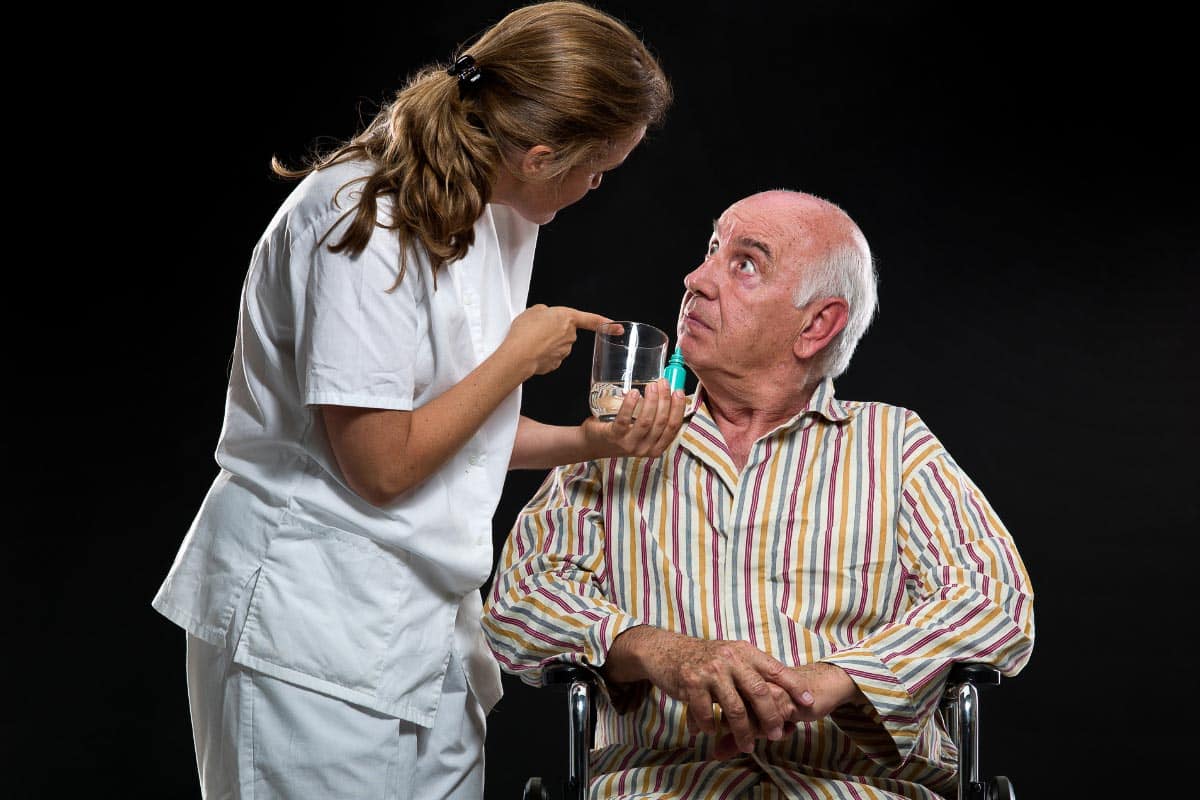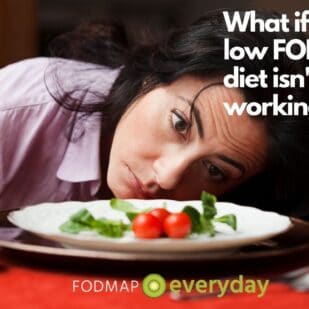First of all, what is the low FODMAP diet? The low FODMAP diet is clinically proven to reduce or eliminate symptoms in up to 75% of those with IBS (and 1 in 8 people worldwide have IBS). You can get better – if you follow this advice. Here are the 10 reasons why you will fail with the low FODMAP diet – and the 3 things you needs to do to succeed. And by succeed, we mean become pain-free!
1. Self-Diagnosing

DON’T DO IT. Your gut hurts. You go online to do some reading; you ask friends for advice. Next thing you know, you decide you have Irritable Bowel Syndrome( IBS).
DO NOT SELF-DIAGNOSE. Many medical issues share the same symptoms of IBS, some of which are life threatening. Please work with a medical doctor, preferably a gastroenterologist.
2. Not Getting a Diagnosis from a Medical Doctor (MD)

And when it comes to diagnosis, you want that to come from a medical doctor, possibly a specialist like a gastroenterologist. Not a naturopath. Not a “nutritionist” (that’s an unregulated term in the US, BTW). A medical doctor will know the proper protocol for an accurate diagnosis, such as screening you for celiac disease and inflammatory bowel disease, before recommending the low FODMAP diet.
3. Not Working with a FODMAP Trained Registered Dietitian (RD)

Once you have an IBS diagnosis and medical recommendation for trying the low FODMAP diet, work with a dietitian. The #1 gap we see in IBS care is that doctors are not explaining to patients that this diet was designed to be undertaken along with a Registered Dietitian, or equivalent in your country.
4. Not Following Your RDs Advice

Once you engage with a Registered Dietitian, listen to them and follow their advice. If you pick and choose their recommendations, then you cannot expect success – and by success we mean becoming IBS symptom-free! You do want that, don’t you?
5. Not Using Reputable Resources

This is easy…there are only two resources you need. Monash University and FODMAP Friendly are the developers of the diet, and the ONLY entities that lab test foods and publish the results.
Download both the Monash University and FODMAP Friendly apps ASAP, and don’t complain that the Monash app costs less than $10! It is a one time fee and the best money you will spend.
6. Not Educating Yourself

There is no getting around the fact that you have to do a fair amount of self-education when it comes to the low FODMAP diet.
Not only is this diet nuanced and complex, but it is not one size fits all. So, you not only have to learn about the diet itself, but you also have to understand how to apply it to your unique medical presentation. This is exactly what a RD will help you with, but when the RD is not around, you have to be able to assess situations yourself correctly, whether that is reading labels, ordering food in a restaurant, or understanding certain symptoms.
7. Not Vetting Resources

When you put the term “low FODMAP” into an online search engine, all manner of results come up. But read this next sentence carefully: Just because something says it’s low FODMAP does not mean that it is. We hate to be the bearer of bad news, but there it’s probably more misinformation about the low FODMAP diet out there than there is accurate information.
You have to vet your resources. As mentioned before, Monash University and FODMAP Friendly are reliable, and considered primary resources. If you are reading an article, or you are looking at a recipe, who produced it? Are they a FODMAP savvy dietitian? Have they been trained by Monash University or FODMAP Friendly?
You can always come to FODMAP Everyday® to learn who we trust and recommend.
8. Deciding to Glean FODMAP Info from Here, There and Everywhere

This is a continuation of the previous bullet point. We see people’s health take a downturn when they decide to use too many different resources, cobbling together what they think is a cohesive plan. Here’s the deal: the low FODMAP diet is an evidence-based diet and has very specific parameters. On the other hand, it is never one-size-fits-all, and everyone’s medical presentation and lifestyle needs are different, and therefore the diet will look different for every single person.
How are you supposed to figure that out? Work with a Registered Dietitian. Many dietitians will meet via telehealth, so you don’t even have to stick close to home to find one.
9. Seeking Advice On Social Media

Even though approximately 1 in 8 people worldwide have IBS, we know that sometimes you can feel alone. Social media can connect to you with other individuals who would never have met otherwise, and that can help you feel less alone. But the problem is that you have not actually “met” any of them.
Would you ask your manicurist for advice about your cardiac issues? Would you ask the opinion of the person standing online at the supermarket about your thyroid problems? We hope not. So why are you asking people on social media to help diagnose you and recommend IBS treatment? This is a surefire way to fail.
10. Jumping Onto Bandwagons That Are Not Clinically Proven

Dealing with IBS day in, day out, sometimes for decades, can leave one desperate. We get it; we’ve been there ourselves. It is very tempting to buy home diagnostic tools, or for “allergy” or “intolerance” tests that are not scientifically sound, or invest in random anti-bloating supplements that are advertised on Facebook and elsewhere.
The headlines sound so promising. Sometimes they even have videos of someone claiming to be a doctor, or health professional, explaining how their product is going to cure you. There is no cure for IBS. The good news is that there are scientifically proven ways to eliminate or greatly reduce your IBS symptoms.
3 Steps To Low FODMAP Diet Success

So, what to do that WILL help you? We promise, there is light at the end of the tunnel! If you have IBS, there are scientifically proven ways to be symptom-free. We wish we could wave a magic wand and help all of you be symptom-free just like that. Until then, all we can do is share with you what DOES work, and what DOESN’T work. The rest is up to you.
Here is what DOES WORK.
1. Get An Accurate Diagnosis from a Medical Doctor

It is crucial to get an accurate diagnosis from a medical doctor – a MD or GI (gastroenterologist). You have to lay an accurate foundation in order for the rest to work.
2. Work With A FODMAP Trained Registered Dietitian

In the US, look for a Registered Dietitian, also referred to as a RD or RDN. In other countries, look for the equivalent.
We think the #1 place where folks get lost is after they leave the GI’s office. Maybe you got a handout of supposed high and low FODMAP foods and were told to “go follow the diet”. The vast majority of people cannot follow this diet successfully alone. But, the diet was never meant to be done alone! The developers of the diet always intended the low FODMAP diet to be undertaken along with a RD.
The RDs are the unsung rockstars. Trust us. You will save time and money AND get to a pain-free place of IBS symptom management MUCH faster if you work with a FODMAP trained RD – and follow their advice. Please read this article on The Role Of The Dietitian vs. The Gastroenterologist; it is eye-opening.
3. Listen To Your Dr. and RD – Not Social Media

Do not take dietary or medical advice from laypeople on social media. We know that learning you are not alone is comforting, but it comes at a price. We implore you to use social media wisely.
When you ask if someone has tried a food, or a supplement, and what their experience/reaction was, you might be tempted to take their answer and apply it to yourself. This is a kind of self-diagnosing. Do Not Do This.
Your medical presentation is not the same as theirs – or anyone else’s. Following advice from another layperson is a surefire way to steer offtrack. It could seriously compromise your progress with the low FODMAP diet, your health in general, and potentially create a worse situation. And, if you are a third party, reading a thread on social media, and just decide to glom onto the layperson’s advice to that other person, your health can be compromised as well.
The Takeaway

So, that’s it. 3 steps toward getting better.
- Get an accurate diagnosis from a medical doctor, or preferably a gastroenterologist.
- ALSO, work with a FODMAP trained Registered Dietitian (RD, or equivalent in your country).
- Do not take dietary or medical advice from laypeople on social media.
We know that it sounds simple enough – and we also know that putting it into practice can be a challenge, but we are here for you every step of the way. Focus on these 3 areas and you WILL find relief.
To learn more come visit FODMAP Everyday®
And Don’t Miss These Articles If You Have IBS

Our team of low FODMAP and IBS trained dietitians and healthcare experts have written 100’s of Wellness Articles to help you THRIVE








This is a great article; thanks! One thing I’d add (and you may already have an article about this) is that if the low FODMAP diet works for up to 75% of people, that means it doesn’t work or isn’t appropriate for at least 25% of people. And just like any medical intervention, there are potential risks and benefits, one risk being developing food anxiety or disordered eating, subclinical or not, especially if you’re not working with an RD who’s aware of this and other options for managing IBS. That’s what happened to me; a slew of doctors recommended very restrictive diets, which led to disordered eating. There was a long wait to see the GI RD at my medical system. Thankfully, she’s great, and she explained many RDs (she’s a research dietician at a large academic medical center) are being more cautious about elimination diets, including the low FODMAP diet because of the risks. I learned from her that more RDs are moving away from the “full elimination” to
model to move away from the “good vs. bad,” “allowed vs. not allowed,” “safe vs. unsafe” binaries that can unintentionally contribute to food fears or overly restrictive diets. I wish that I had known that earlier on, or about other options like gut directed hypnotherapy, which is why I wanted to share it.
Hi there! Thank you for the thoughtful note. Yes, we have the info you mentioned in several places on the site, including the percentage helped, articles on gut directed hypnotherapy, using words like “unsafe” and “safe”, etc. All so important! Sounds like you have found your way to taming your triggers, which is great to hear.